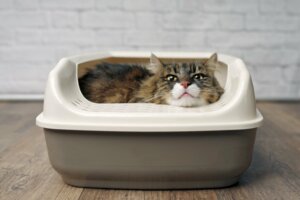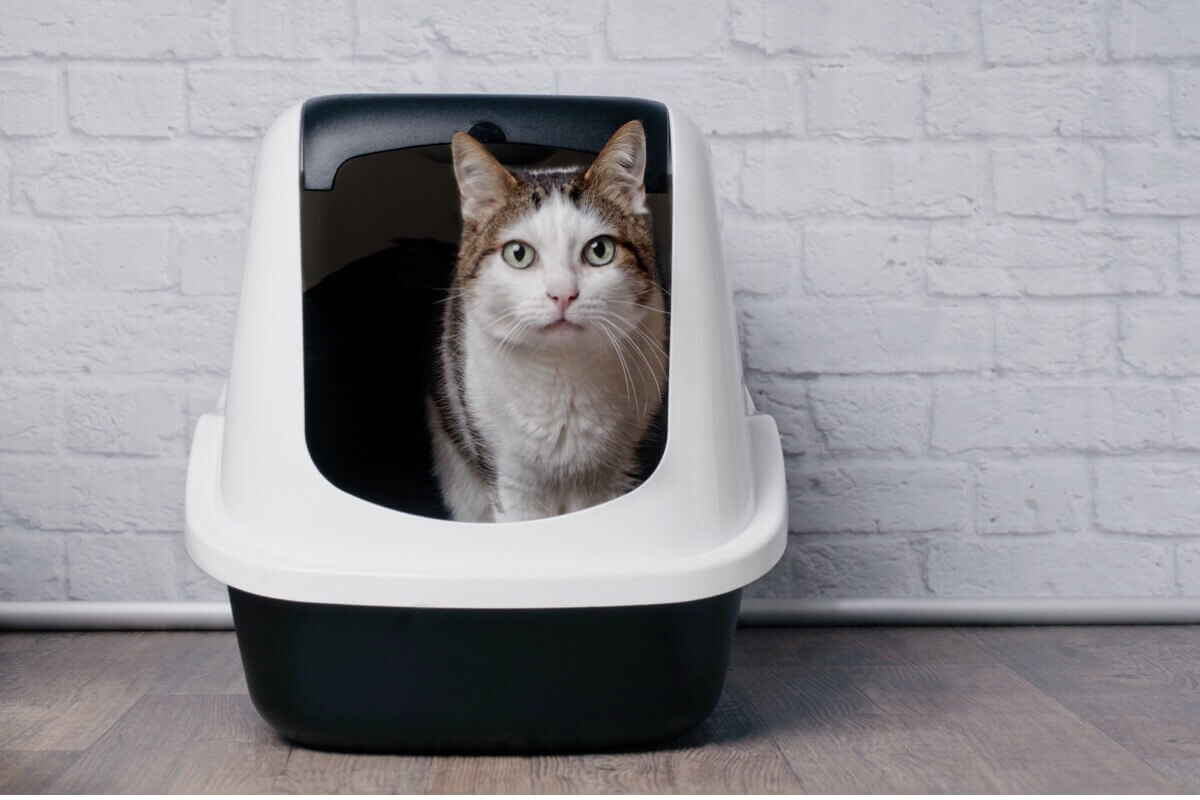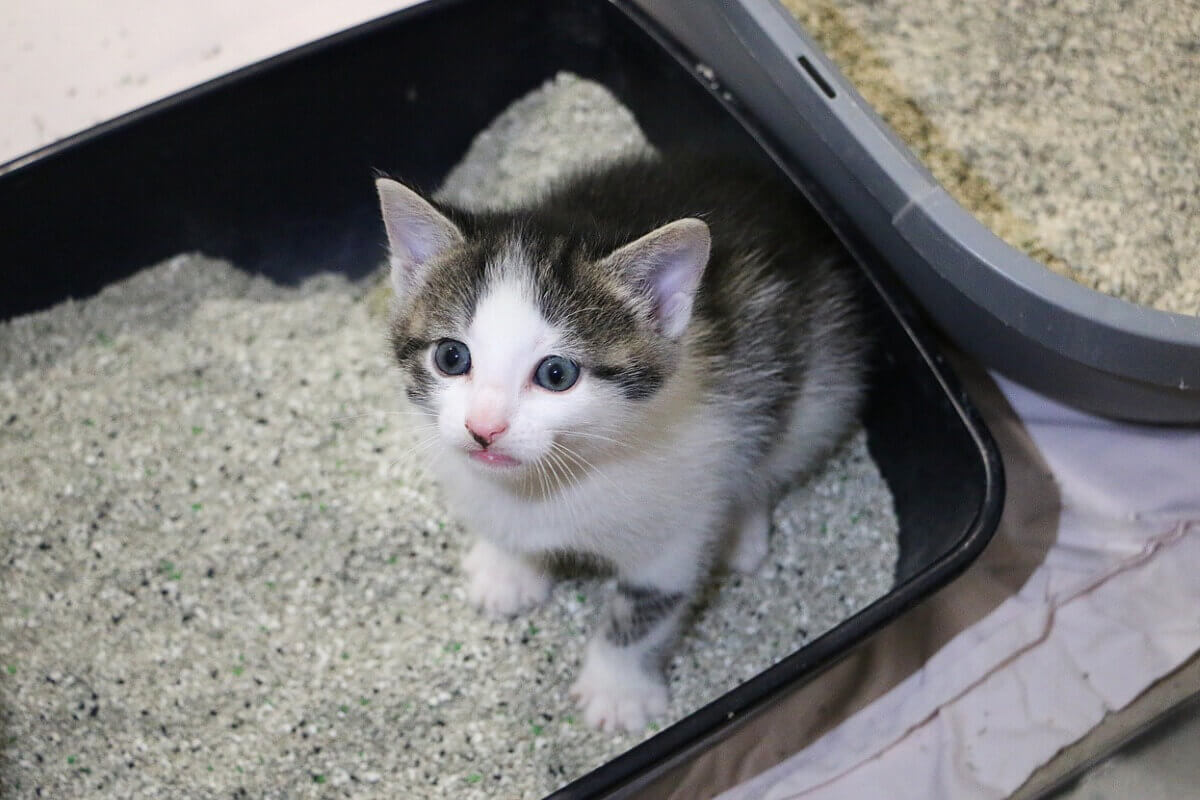Why Do Cats Bury Their Feces?

Watching a cat is always a source of tenderness and fun, but also a source of questions. These felines show a series of behaviors that, without a good basis of knowledge about cats, seem to make no sense or to be simple quirks. An example of this is the fact that cats bury their feces, a behavior that seems instinctive but that doesn’t make much sense in the context of a human home.
So, in this article, you have all the information you need to understand why your feline kicks with its back legs every time it steps out of its litter box. Whether it’s because you live with these animals or because you’re fascinated by their behavior, we recommend that you keep reading.
Feces and felines
Although feces aren’t at all pleasant to smell and handle, they’re an ample source of information about the subject that produces them. This is even more true when dealing with animals like cats, who are capable of smelling the pheromones present in this waste.
All the characteristics of the feces are relevant when obtaining data: Quantity, odor, color, acidity, and the presence of micro-organisms or parasites are useful parameters. The totality of these values translates into different smells for the cat, who’s able to deduce what specific species has produced these feces, what state of health it’s in, and even what it’s eaten.
As you can imagine, obtaining this information is as beneficial for the one who finds it as it is dangerous for the one who leaves it. You shouldn’t lose sight of the fact that we’re talking about intelligent animals: Cats bury their feces only if it’s convenient for them, and they know exactly when to do it.
Feces are a sort of identity card for living beings in the natural environment.

Cats bury their feces because of hygiene
Although it’s hard to believe coming from an animal that urinates on the curtains and brings you dead animals as gifts, cats are creatures that appreciate living in a clean environment. The proof of this is the ease with which they learn to take care of their needs in the litter box and the amount of time they spend grooming per day.
Generally, those specimens that bury their feces do so to keep their environment more hygienic and free of odors. It’s a sign of the feline’s personality, just like when they make an effort not to release a single drop of urine out of the litter box.
Feces and territoriality
When cats bury their feces, there’s another big reason behind it: Their territoriality. If a feline leaves its waste in a particular place, other animals can smell it. This is both beneficial and detrimental, for just as the feline marks that spot as its own and others avoid it, competitors that are stronger and more dangerous can find a trail to chase it.
For example, small cats that share a habitat with big cats tend to bury their feces to avoid encountering them.
Because covering feces considerably reduces the smell, this act is also a sign of submission. In this way, the animal sends the message that it doesn’t intend to compete for territory and that it wants to go unnoticed.
Why do my cats bury their feces at home, where there’s no danger?
Although the whole context of the home would have to be taken into consideration to make specific claims, we can say that a domestic cat buries its feces when it considers the rest of the family members (human or not) as the “owners” of the territory. That is, it’s a signal that it accepts that it’s in someone else’s home.
Conversely, cats that don’t cover their feces after using the litter box send the signal that they assume they’re in their territory. If they don’t bury them, the smell of the feces travels further away, indicating to anyone who enters that they’re in the area.
Cats who don’t use their litter box
Following the logic presented above, one might deduce that those cats who don’t go to their litter box have a greater need to mark territory in the house. However, this isn’t the case: Remember that domestic felines appreciate hygiene and prefer to use litter boxes.
So, if your cat isn’t using its litter box, it’s very likely that something is wrong with its health and you should make a call to the vet. Among the most common causes of this behavior are the following:
- Pain when urinating or defecating: The cat associates the discomfort it feels with the litter box, and therefore avoids it.
- Incontinence: Sometimes, the animal doesn’t reach the litter box in time when they need to go. An example of this is older felines who suffer from age-related ailments.
- Stress and anxiety: These psychological conditions, often caused by changes in the feline’s daily life, push the animal to mark its territory obsessively.
- Lack of hygiene in the litter box: If the litter box is overflowing or not cleaned properly, the cat won’t want to use it.

In any case, the only person qualified to make a diagnosis and implement a treatment is your veterinarian. If you have any doubts, go to the vet and follow their instructions, because whether or not your cat buries its feces, the important thing is that it lives a healthy and calm life.
Watching a cat is always a source of tenderness and fun, but also a source of questions. These felines show a series of behaviors that, without a good basis of knowledge about cats, seem to make no sense or to be simple quirks. An example of this is the fact that cats bury their feces, a behavior that seems instinctive but that doesn’t make much sense in the context of a human home.
So, in this article, you have all the information you need to understand why your feline kicks with its back legs every time it steps out of its litter box. Whether it’s because you live with these animals or because you’re fascinated by their behavior, we recommend that you keep reading.
Feces and felines
Although feces aren’t at all pleasant to smell and handle, they’re an ample source of information about the subject that produces them. This is even more true when dealing with animals like cats, who are capable of smelling the pheromones present in this waste.
All the characteristics of the feces are relevant when obtaining data: Quantity, odor, color, acidity, and the presence of micro-organisms or parasites are useful parameters. The totality of these values translates into different smells for the cat, who’s able to deduce what specific species has produced these feces, what state of health it’s in, and even what it’s eaten.
As you can imagine, obtaining this information is as beneficial for the one who finds it as it is dangerous for the one who leaves it. You shouldn’t lose sight of the fact that we’re talking about intelligent animals: Cats bury their feces only if it’s convenient for them, and they know exactly when to do it.
Feces are a sort of identity card for living beings in the natural environment.

Cats bury their feces because of hygiene
Although it’s hard to believe coming from an animal that urinates on the curtains and brings you dead animals as gifts, cats are creatures that appreciate living in a clean environment. The proof of this is the ease with which they learn to take care of their needs in the litter box and the amount of time they spend grooming per day.
Generally, those specimens that bury their feces do so to keep their environment more hygienic and free of odors. It’s a sign of the feline’s personality, just like when they make an effort not to release a single drop of urine out of the litter box.
Feces and territoriality
When cats bury their feces, there’s another big reason behind it: Their territoriality. If a feline leaves its waste in a particular place, other animals can smell it. This is both beneficial and detrimental, for just as the feline marks that spot as its own and others avoid it, competitors that are stronger and more dangerous can find a trail to chase it.
For example, small cats that share a habitat with big cats tend to bury their feces to avoid encountering them.
Because covering feces considerably reduces the smell, this act is also a sign of submission. In this way, the animal sends the message that it doesn’t intend to compete for territory and that it wants to go unnoticed.
Why do my cats bury their feces at home, where there’s no danger?
Although the whole context of the home would have to be taken into consideration to make specific claims, we can say that a domestic cat buries its feces when it considers the rest of the family members (human or not) as the “owners” of the territory. That is, it’s a signal that it accepts that it’s in someone else’s home.
Conversely, cats that don’t cover their feces after using the litter box send the signal that they assume they’re in their territory. If they don’t bury them, the smell of the feces travels further away, indicating to anyone who enters that they’re in the area.
Cats who don’t use their litter box
Following the logic presented above, one might deduce that those cats who don’t go to their litter box have a greater need to mark territory in the house. However, this isn’t the case: Remember that domestic felines appreciate hygiene and prefer to use litter boxes.
So, if your cat isn’t using its litter box, it’s very likely that something is wrong with its health and you should make a call to the vet. Among the most common causes of this behavior are the following:
- Pain when urinating or defecating: The cat associates the discomfort it feels with the litter box, and therefore avoids it.
- Incontinence: Sometimes, the animal doesn’t reach the litter box in time when they need to go. An example of this is older felines who suffer from age-related ailments.
- Stress and anxiety: These psychological conditions, often caused by changes in the feline’s daily life, push the animal to mark its territory obsessively.
- Lack of hygiene in the litter box: If the litter box is overflowing or not cleaned properly, the cat won’t want to use it.

In any case, the only person qualified to make a diagnosis and implement a treatment is your veterinarian. If you have any doubts, go to the vet and follow their instructions, because whether or not your cat buries its feces, the important thing is that it lives a healthy and calm life.
All cited sources were thoroughly reviewed by our team to ensure their quality, reliability, currency, and validity. The bibliography of this article was considered reliable and of academic or scientific accuracy.
- Feldman, H. N. (1994). Methods of scent marking in the domestic cat. Canadian Journal of Zoology, 72(6), 1093-1099.
- Cat Not Using Litter Box: Causes and Solutions. (s. f.). Best Friends Animal Society. Recuperado 2 de diciembre de 2021, de https://resources.bestfriends.org/article/cat-not-using-litter-box-causes-and-solutions
- Cat Spraying in House. (s. f.). Best Friends Animal Society. Recuperado 11 de noviembre de 2021, de https://resources.bestfriends.org/article/cat-spraying-house
- Caring for an Incontinent Cat. (s. f.). Best Friends Animal Society. Recuperado 2 de diciembre de 2021, de https://resources.bestfriends.org/article/caring-incontinent-cat
This text is provided for informational purposes only and does not replace consultation with a professional. If in doubt, consult your specialist.








